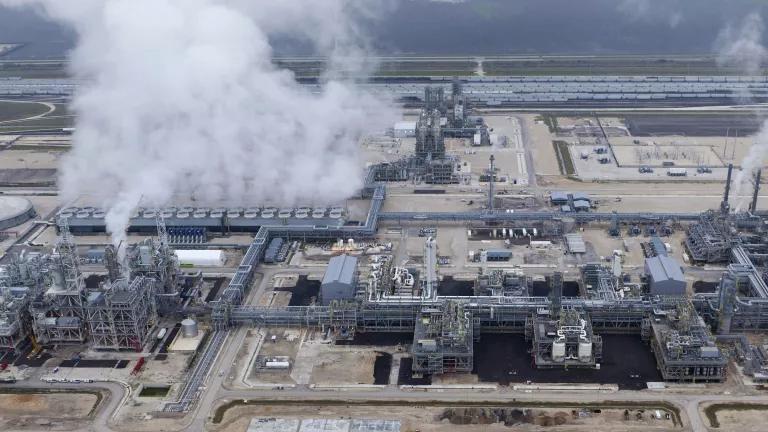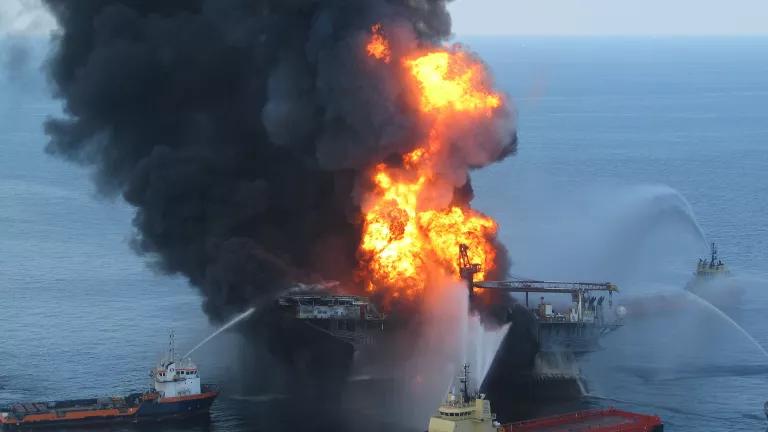It’s Clear as a Bell: Risky ACP and MVP Must Be Stopped Now
NRDC and many others have long pointed out the immense risks to water supplies and excessive costs to Virginians from two unneeded gas pipeline projects, and now they must be stopped once and for all.
The Atlantic Coast Pipeline (ACP) and the Mountain Valley Pipeline (MVP) would be disastrous for Virginia, West Virginia, and North Carolina.
NRDC, partner organizations, elected officials, landowners and concerned citizens have shown, through scientific and expert analysis, that these pipelines pose untenable risks to clean water and clean air, threats to wildlands and wildlife, harms to consumers and landowners, dangers to environmental justice communities, and are simply not needed. Their limited benefits only go to corporations and their shareholders.
Governors, federal agencies and state regulators ignored these threats, even as we and many others raised concern after concern. But the long list of the risks of these dirty, unnecessary, and dangerous pipelines cannot be denied, particularly in a court of law. Both pipelines have been found with alleged violations of multiple state and federal laws. There is so much information on the problems of these pipelines that it’s hard to keep up. But it’s clear that these two pipelines would bring to our region too many risks with too little benefit and must be abandoned. Here is just some of the latest news:
Mountain Valley Pipeline
- December 13: The Virginia State Water Control Board voted to initiate a formal hearing process to consider revoking the Clean Water Act Water Quality Certification of the Mountain Valley Pipeline.
- December 7: Virginia Attorney General Mark Herring and the Virginia Department of Environmental Quality (DEQ) filed a lawsuit against MVP for “repeated environmental violations” of the Commonwealth’s environmental laws and regulations and its Clean Water Act Water Quality Certification. MVP is alleged to have violated ten different state laws.
- An inspection company contracted by DEQ to monitor MVP’s compliance identified more than 300 violations between June and mid-November 2018. The fact that these problems were documented is not all good news. These are only the ones that have been identified; there may be more. And they never should have happened in the first place. As a former Water Board member asked, how is it that the DEQ allowed so many violations to occur unabated, for months and months? And why didn’t DEQ issue a stop work order early on in this process to prevent additional violations instead of allowing them to occur? Sadly, there are no good answers to these questions.
- December 3: The Rutherford Institute, a Virginia non-profit, filed an amicus brief with the U.S. Supreme Court in support of reinstating a lawsuit by Virginia landowners against MVP, making the case that landowners have been denied their constitutional right to due process and a fair and meaningful hearing before a court on their claims that FERC unconstitutionally delegated the power to take private property to pipeline companies.
- November 27: The U.S. Court of Appeals for the Fourth Circuit ruled that the Army Corps of Engineers, part of the Trump Administration, violated the Clean Water Act when it issued a Nationwide 12 Permit to MVP for construction in West Virginia. The court vacated the permit, stopping construction at stream crossings for MVP in West Virginia.
Atlantic Coast Pipeline
- December 13: The Fourth Circuit Court of Appeals found that the U.S. Forest Service, part of the Trump Administration, violated the National Forest Management Act and the National Environmental Policy Act and did not fulfill its duty to protect forest resources when it allowed the Atlantic Coast Pipeline (ACP) to cross the George Washington National Forest, the Monongahela National Forest, and the Appalachian Trail.
- December 7: The 4th U.S. Circuit Court of Appeals stayed a permit issued by the U.S. Fish and Wildlife Service, part of the Trump Administration, that would have allowed killing of four endangered species, because of concerns that it may violate the Endangered Species Act.
- December 7: The Virginia State Corporation Commission (SCC), charged with protecting Virginia consumers, found that Dominion Energy's long-term forecasts for energy demand are “unrealistically high” and the utility failed to consider lower cost alternatives for consumers, and rejects Dominion’s request to suppress expert testimony and analysis that shows that Dominion ratepayers would be saddled with up to $2.5 billion in excess costs to pay for Dominion’s unneeded pipeline.
- November 9: The Virginia Air Pollution Control Board voted to delay consideration of an air permit for an ACP compressor station in Buckingham, Virginia until December. Board members expressed concerned that the permit review process did not adequately consider the environmental justice implications for the neighboring community or the suitability of the location. The Air Board meets again to discuss this permit on December 19.
- November 7: The 4th Circuit stayed the Army Corps of Engineers permit that allowed stream-crossings because of concerns that it violates the law.
- November 1: ACP announced the costs of the pipeline have ballooned from an original estimate of $5 billion to a current estimate of $6.5-7.0 billion, which doesn’t even include the financing costs. On December 5, mothers protested the expected rate hikes from ACP and the potential impacts on their families.
One of my favorite quotations is from John Maynard Keynes:
It takes courage to admit that decisions need to be revisited, but it is also the path to wisdom.




